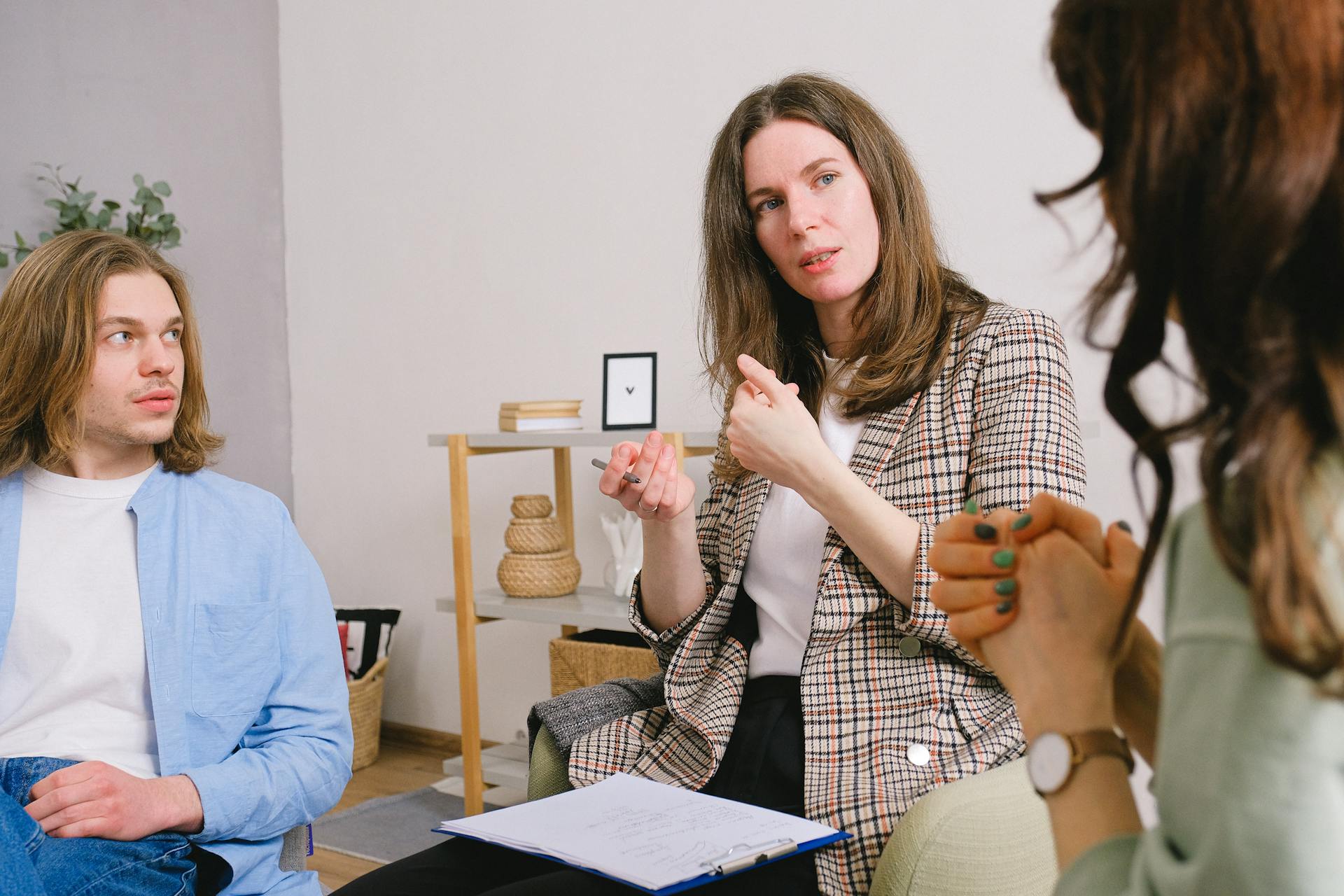How To Convince Your Partner To Go to Therapy
You’re eager to start couples therapy and improve your relationship, but your partner is resistant. Besides ultimatums and threats, how can you get your partner to give couples therapy a try?
Reasons People May Resist Going to Therapy
- They’re scared of change. Change can be scary. It’s uncomfortable. We are creatures of habit, even if that habit is not so good. We tend to hold on to what we know. Therapy would be new. And they probably know that the things you would do in therapy and at home would be new too.
- They fear judgment. Perhaps they already have shame for wrongdoings or behavior they regret. They may see therapy as a chance for their partner and their therapist to gang up on them.
They may be afraid that their partner was right all along or they may fear the dreaded “I told you so”. This alone can discourage some from seeking therapy. They may worry that if their significant other is proven “right” in therapy, he or she will hold it against them in the future, finding any chance to rub it in their face again.
- They’re worried about the cost. Finances are another reason why someone may be hesitant to go to therapy. Therapy is an investment. But many people get hung up on the cost, not even allowing themselves to see what they get with that money. Imagine your car has an issue with the engine, but you don’t want to pay the money to fix it. The car may still work, but not for long.
- They’re not comfortable talking about feelings. They won’t open up to you, so opening up to a stranger seems absurd. Vulnerability is not easy. The point of therapy is to talk about your feelings, and what they mean. This may not be something your partner is enthusiastic about, probably because it’s foreign and uncomfortable. This may be part of the reason why couples therapy is a good idea.
- They’re not comfortable including a third person in your relationship issues. They may be nervous or even embarrassed to share the ins and outs of your relationship with an outsider. Their hesitancy may stem from their unwillingness to talk about deeply personal things with someone else.
- They associate therapy with weakness Some people believe that going to therapy means admitting defeat. To them, it means that they failed. They may need help seeing therapy for what it is – a brave decision to improve your relationship and yourself.
- They associate therapy with a failed relationship Similar to the aforementioned, they may think that even the idea of therapy, talking about it, contemplating going, means it’s too late. And if they were to say yes to therapy it would put the nail in the coffin. They see putting off therapy as a way to stay in the relationship, instead of the opposite.
- They’ve had a bad experience with therapy Maybe they’ve tried therapy before, but they had a negative experience that left a bad taste in their mouth. Perhaps it was the approach of that therapist that didn’t feel good for them. Or maybe they simply weren’t ready at that time, so they feel like therapy “doesn’t work”.
Overcoming Negative Stigmas About Therapy
Therapy Stigma #1: “I don’t want to be told what to do.” A therapist is not a teacher. It’s not like school, where you show up and take notes, gathering information from a person who knows more than you. A therapist is not your parent or other family member. They’re not going to scold you, reprimand you, or boss you around. Rather, a therapist is a third-party consult. A good therapist does not claim to know better. They are objective. They can provide insight and offer advice, but it’s up to you to take it.
Therapy Stigma #2: “It’s too expensive.”: Sometimes people imagine the cost of therapy to be higher than it is. They may not be aware of the options – payment plans, and sliding scale options for example. Or they may just need the numbers to feel more comfortable – fear of the unknown.
Therapy Stigma #3: “It’s only for couples headed for divorce/breakup”.: Many people believe that counseling is only for couples at the end of the road and headed for a divorce. This is far from the trust as couples therapy is always a good idea. It shouldn’t be reserved for the time when the wheels are falling off. Better to avoid getting there at all with preventive therapy.
Therapy Stigma #4: “It’ll fix my relationship/my partner”. Couples therapy is not a magical elixir that can cure all problems. Couples therapy can help to make positive changes IF you and your partner are willing to put in the work. Your therapist does not have all the answers. You cannot show up to therapy and expect to see change simply by osmosis. But if you take advantage of the tools and skills you gain, you will reap the benefits.
How To Convince Your Partner to Go to Therapy
How and when you talk about couples therapy can make all the difference. You both should be calm. In the heat of an argument is not a good time to bring up therapy. Patience is mandatory. You can’t rush the asking, nor can you expect them to be in therapy the day after you invite them.
Connect
Set the mood, and bring on the good vibes. Maybe that means going out to dinner, sharing an activity you both enjoy or simply watching a movie together. Whatever it is, spend quality time together. You want to connect emotionally with your partner. Show (and tell) them they matter to you.
Plan Out the Conversation
This is where you invite your partner to have a conversation with you. For example, “Honey, can we have a conversation about what we want for our relationship?” Or “Can we talk about something important to me?” Make sure your tone is gentle and calm. You don’t want to scare your partner or put them on the defensive.
You can also write your partner a letter if you feel this would be more effective, like if you have an avoidant partner. This can help them prepare. The letter is still an invitation to have a conversation and not a substitute for one.
Time Your Conversation Well
Bring up therapy only after you feel like you’ve connected. You may need to wait more time, to feel like you’re in a better place, and your partner will be more receptive. You don’t want them to feel ambushed. Read your partner. Are they particularly stressed this week? Do they have an extra busy week? Have they been getting little sleep? While it’s never going to be the perfect time, you’ll want to aim for a time when they’re more relaxed.
Explore Your Partner’s Perspective
Start off by saying something like “I want to know how our relationship could feel better for you”. And then ask a question, “What do you think we could do differently that would improve our relationship?” They may accuse you of being the problem. Try to listen without getting defensive. Remember that blaming is part of the pain they are feeling.
Invite Them to Therapy
Now you can request that your partner join you in therapy. It is not a demand. You will want to present couples therapy as a choice they have.
Example script: “I love you and our relationship is very important to me. I think couples therapy could stop the cycle of fighting we get into and allow us to grow closer together and be happier. I’d love for you to join me, but you’re free to say no if you choose.”
You can ask them to think about it for a period of time and to come to you with questions as they ponder the idea again. Check-in to revisit the idea. If they say no, you can ask more questions, but ultimately you’ll need to respect their decision.
Ways To Make Talking About Therapy Easier
Focus on Your Goals and Share Your Intentions
Always go back to what you want to get out of therapy. This is what it’s all about. Why is this goal important to you? What does your relationship need? Keep revisiting this with your partner, instead of focusing on what the problem is. Instead of saying “We just can’t talk to each other and I’m tired of it”, say “I really want to feel closer to you and know that we can talk about everything openly and feel closer to each other. I really care about our relationship and want to invest in it”.
Ask your partner questions to find out their goal. What would they like to improve in the relationship? What would make therapy worth it for them? What do you think will be the cost if we don’t improve our relationship? Help your partner see the motivation to attend therapy.
Share Your Experience
If you haven’t attended therapy on your own, it’s harder to sell it to someone else. It’s helpful to have first-hand experience to share with your partner. Your partner is more likely to be convinced when you can talk about your own personal story. If you are currently in therapy or were in the past, consider sharing more about your journey.
Even the negatives can be helpful to share. For example, if you ended up switching therapists to find one that met your needs better or if you had a hard time opening up at first. This helps to remove the fear of the unknown and visualize how they could benefit from therapy. It will also give them the opportunity to understand you more deeply. Who knows, it may even trigger their own self-reflection.
Discussing the Benefits of the Relationship as a Whole
Research has shown that couples therapy is effective. Specifically, the American Psychological Association states that therapy is successful in restoring relationships 75 percent of the time. Studies have included couples of various backgrounds and those in high-stress situations. So couples therapy does work for a lot of people. And more and more couples are seeking outside help. In fact, couples therapy is a big contributing factor to why the divorce rate has plummeted in the United States.
Some of the benefits couples therapy can offer:
- Safe space for you and your partner to be vulnerable
- Impartial sounding board
- Tools to break unhealthy cycles
- Increased attunement
- More effective communication
- Coping strategies
Most couples seek couples therapy only at a point of distress, but couples therapy is helpful even without an obvious problem present. It can be used to prevent big issues from showing up in the future.
Choosing an Appropriate Therapist and Setting Realistic Expectations
Choosing the right therapist is huge. In choosing a therapist, there are two important factors:
1) The therapist specializes in the area in which you want to work.
2) You feel comfortable on a personal level with that therapist.
Some people don’t realize that you can get a feel for your therapist before an actual session. Many therapists offer an initial call where you can ask questions about their background and experience like their style and approach and the types of therapy they specialize in.
To make a more educated decision, learn about the different types of therapy. You can also ask them to describe a first session (since that’s usually different) and what a typical session would look like. This is your chance to interview them! Additionally, you and your partner should know that you can switch therapists at any point.
Go to Therapy Without Them
Having both partners present is preferable, but if one partner is unwilling to attend couples therapy, progress can be achieved with only one partner. the emotions you process, skills you learn, insights you gain, and the parts of you that experience validation and healing.
Instead of getting angry and blaming them for not wanting to better your relationship, let your partner know you plan to go to therapy regardless. Let the therapist know that you are invested in improving your relationship and your partner isn’t ready to attend. Your therapists may even have new ideas on how to influence your partner.
A Final Note
It takes two to tango. It takes two to improve your relationship. While you could kidnap them or trick them into believing the office is actually a restaurant for date night, it’s not bound to go over well. Even if you force your partner to go into the office, you can’t force them to participate. And if they’re attending against their will, you’re not likely to get much out of your sessions. In fact, it could create resentment.
Patience is key. Your partner could change their mind if you respect their choice to attend couples therapy. Meanwhile, attend therapy on your own. They may be inspired by the commitment they see you putting in.






